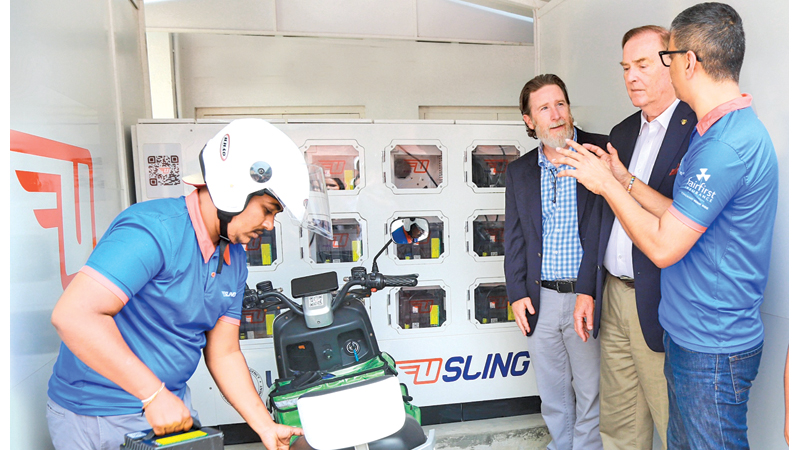Sling Mobility, in collaboration with the United States Agency for International Development (USAID) Sri Lanka Energy Program, launched the “360° Sustainable Mobility” battery swapping project. The launch took place at the Center for Women’s Research (CENWOR) in Colombo recently.
General Partner of Lion Ventures in Sri Lanka Love Yadav and Director, Office of Economic Growth, USAID, Chris Powers were present.
This groundbreaking project will set up an operational framework for an electric vehicle (EV) ecosystem, with an emphasis on using solar power as a main energy source. The pilot project introduces two solar-powered battery-swapping stations at CENWOR and Fusion Sarvodaya in Colombo. The stations have the capacity to recharge and store batteries, ensuring a seamless and sustainable electric two-wheeler refueling model.
Sling Mobility’s approach covers all aspects of the EV ecosystem, from energy generation to consumption. The company’s business strategy, centered around providing cost-effective and efficient mobility solutions to the retail logistics sector through its smart electric vehicle ecosystem, has now become a tangible reality. The model addresses the need for efficient battery swapping, minimising downtime for riders, particularly in the context of collaborative efforts with Uber for food delivery services. This not only results in cost and time savings but also facilitates a trial of the business model’s effectiveness.
The initiative introduces a battery subscription, which significantly enhances affordability by eliminating the initial high-cost barrier for riders. By focusing on the most substantial individual cost for e-bikes and batteries, the company aims to make electric vehicle adoption more accessible.
Sling Mobility and the USAID Sri Lanka Energy Program are committed to engaging with marginalised and economically disadvantaged populations, aiming to stimulate their interest in the retail logistics industry through the use of electric vehicles. The project organised and executed four outreach initiatives, reaching over 100 participants from diverse backgrounds. As a result, the team trained 16 drivers and supported 10 people to obtain licences for the first time, showcasing the project’s commitment to fostering inclusivity and economic empowerment.
Sling Mobility’s collaboration with USAID marks a significant step towards a sustainable and green future for urban mobility in Sri Lanka. The “360° Sustainable Mobility” battery swapping project is not just a technological innovation but a testament to the transformative power of partnerships driving positive change. The USAID Sri Lanka Energy Program is one component of the United States’ long-standing partnership with the Sri Lankan people to promote a healthy, educated, and employed population. The program supports transforming Sri Lanka’s power sector into a market-based, secure, reliable, and sustainable system by mobilising investment to deploy advanced technologies, increase flexibility, and enhance competitiveness.









